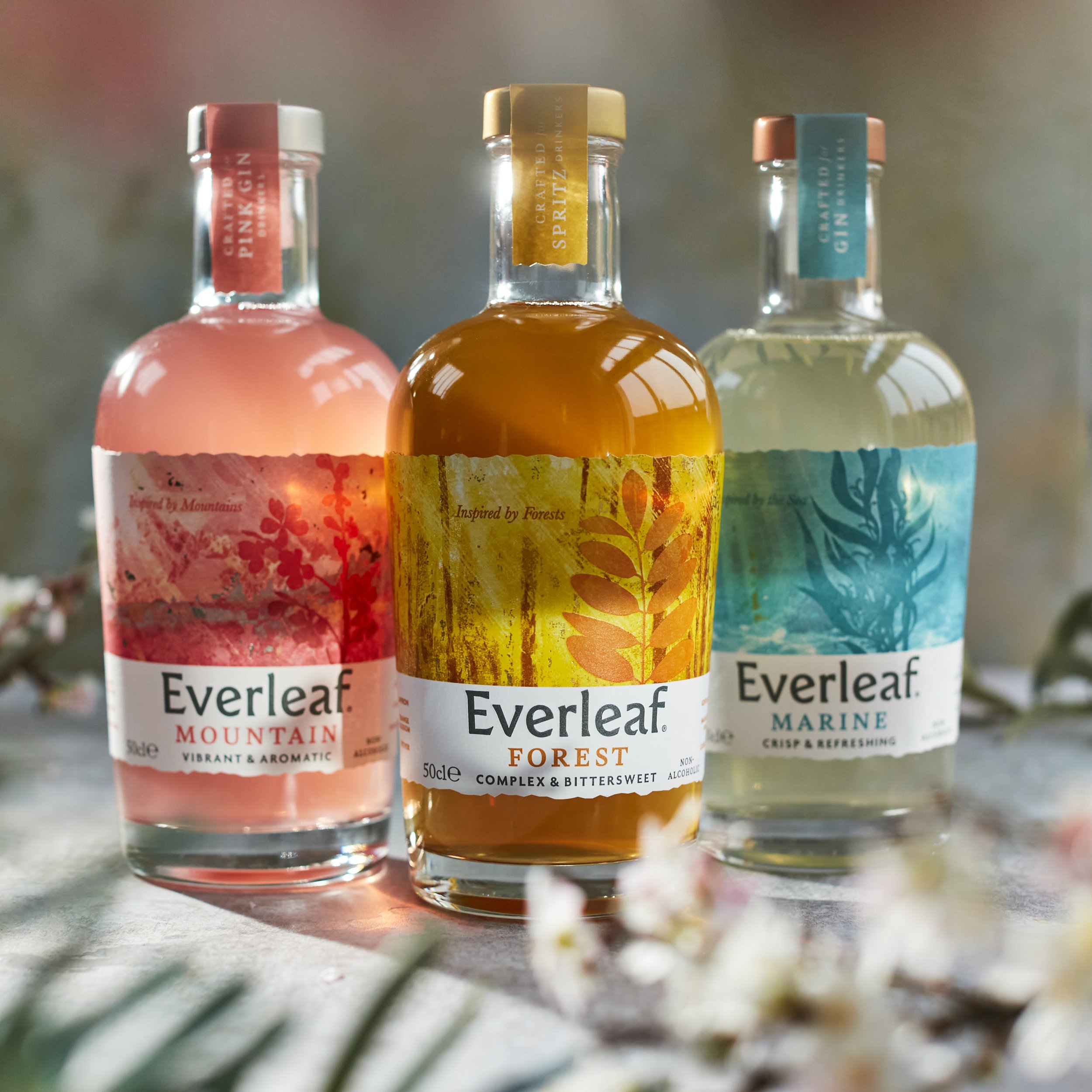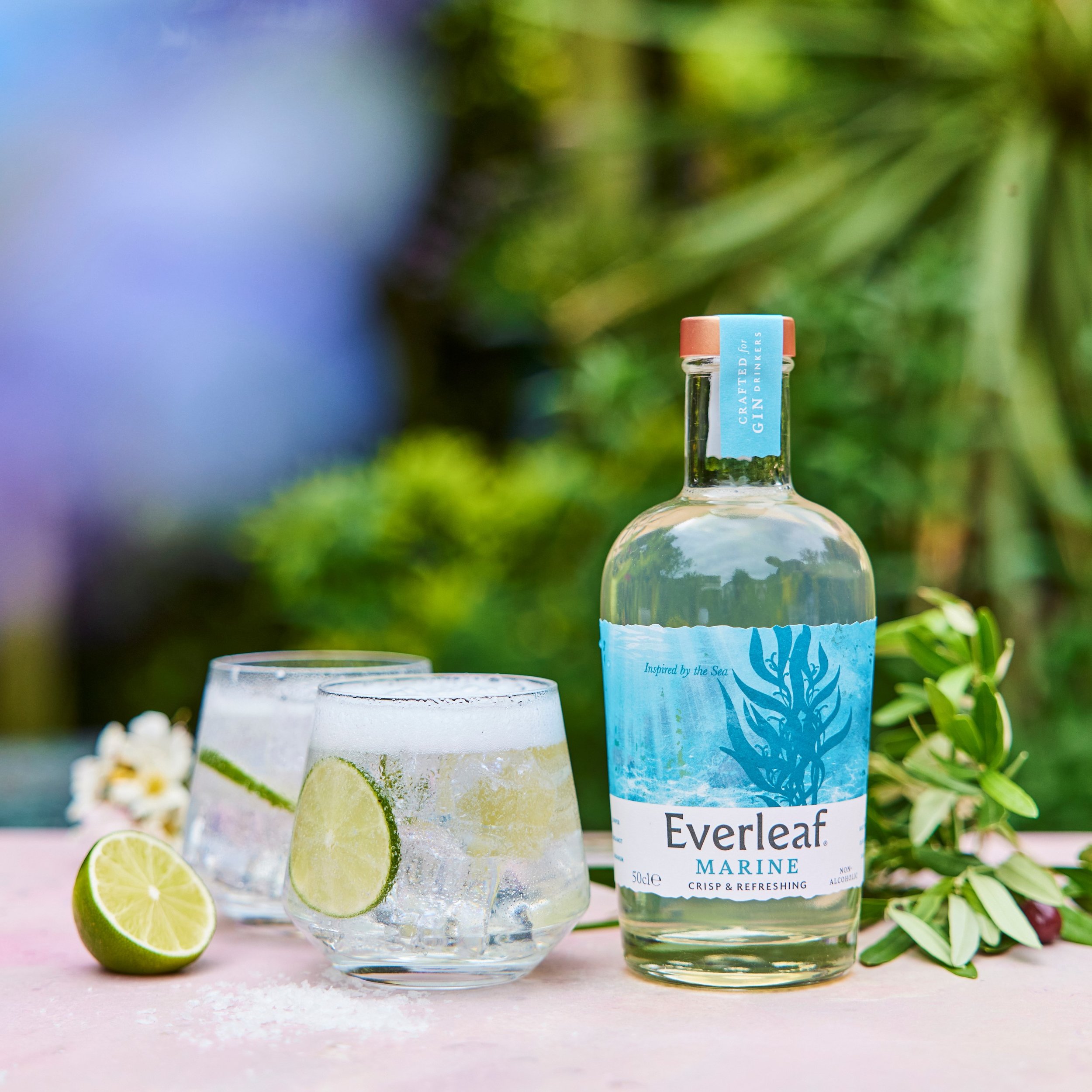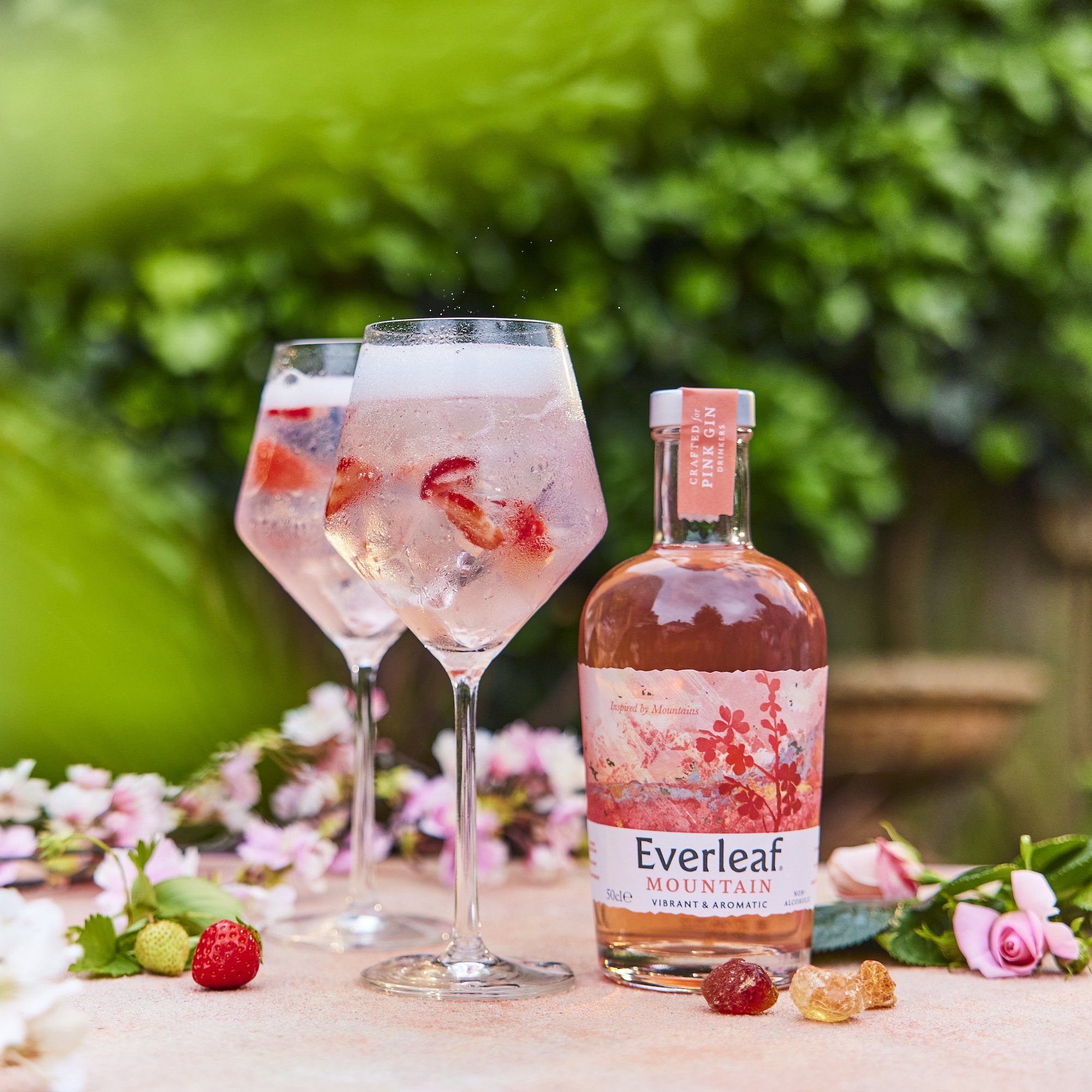Everleaf: A Sustainable Approach to Zero Proof Spirits
Everleaf line up
In recent years, the non-alcoholic beverage industry has experienced a significant transformation. With a growing number of consumers seeking alternatives to traditional alcoholic drinks, the market has become ripe for innovative brands that offer something other than just a weak imitation of existing spirits. Seedlip pioneered this category in 2014, with aromatic white spirits that are adult but don’t attempt to be a direct replacement for any one spirit. Their beverages are gin adjacent in that they are generally dry and include various botanicals but they have a character all their own. Seedlip is still the market leader in the non-alcoholic category (see chart) with £15.2 million in revenue and 33% market share in 2021, but newer brands like Everleaf are coming on quickly by focusing on sustainability.
A Non-Alcoholic Aperitif
Everleaf Mountain
Everleaf, a British-born non-alcoholic aperitif, founded five years ago has carved a niche for itself by combining the allure of exotic botanicals with a commitment to sustainability and balance. Targeted towards adult consumers who want to enjoy a sophisticated beverage without the effects of alcohol, Everleaf offers three flavor profiles that celebrate nature. Forest is complex and bittersweet, a blend of sustainably sourced botanicals, from exotic saffron and vanilla to honeyed orange blossom. Mountain is vibrant and aromatic, a blend of botanicals, from elegant cherry blossom and strawberry to bittersweet rosehip. Marine is crisp and refreshing, redolent of umami soaked kelp forests, with zesty begamot and tropical sea buckthorn.
Paul Matthew of Everleaf
Background
The Everleaf story starts with Paul Mathew, who spoke to us recently from The Lucky Saint, a pub in South London that provides a true pub experience for consumers of non-alcoholic beverages and alcohol drinkers alike. The pub, established by the owners of Lucky Saint Brewing, a producer of non-alcoholic beer, is a regular hangout for industry insiders. It proved to be a fitting setting for a discussion of the growing appetite for non alcoholic beverages, especially in the UK. Mathew has 30 years experience as a bartender and owns three (alcoholic) bars in London.
“For me, hospitality is something I love, I love serving people, and I love making drinks and developing cocktails,” he says. Mathew is a master blender, who, prior to being a bartender, was a nature conservationist, to carefully select and balance each botanical to create a unique and harmonious blend. “My dad was a botanist so I grew up around plants and knowing which plants grew where but I was more interested in people’s interaction with them and how we can conserve them and use them sustainably. It seemed like the perfect opportunity to use that knowledge to work in a category that doesn’t have any rules. It’s not like whisky, it doesn’t have to be aged three years in a barrel.” The result is a beverage with a complex flavor profile that mimics the depth and sophistication of alcoholic aperitifs. Learning to work without alcohol was hard for Mathew at first. Because alcohol is such a good solvent, without it, it meant using more of the ingredients to get the same level of flavor extraction.
Everyleaf Marine with drinks
The botanicals found in Everleaf’s beverages are sourced from around the world. The brand prides itself on using only the finest natural ingredients, such as saffron from Afghanistan, vanilla from the island of Madagascar, and Iris flower from Florence. These botanicals are expertly blended to create a complex and layered flavor profile that is both refreshing and indulgent.
Foraging a unique path to Sustainability
Everleaf Forest with sprtizes
“We’re not like Lyres, who aim to replace everything on the back bar with their equivalent, whether that’s gin, or absinthe or whisky or anything in-between,” says Mathew. “We want to be our own thing. That’s why bartenders are using our products alongside alcohol because we don’t have a flavor profile that matches something else.”
What really sets Everleaf apart from other non-alcoholic beverages is its commitment to sustainability. Unlike with other brands who could be accused of merely greenwashing, Everleaf has codified its approach. There are three branches to its strategy: how the ingredients are sourced, how the company works as a business, and how it gives back. “We assess whether or not the plant is in any way threatened or at risk in trade. If it is, we won’t use it (this is basic “good” practice), he explains. In its early days, Everleaf Forest contained quassia (which is on the IUCN Red List). When its supplier couldn’t provide the proof that it was sourced sustainably, Everleaf stopped using it immediately. Everleaf sources ethically sourced ingredients wherever possible such as its Fair Trade certified cane sugar. Even better is when the sourcing actively benefits communities and the plant conservation that is dear to Mathew’s heart. “We have things like our Madagascan vanilla, sourced from a programme that is funding schooling, adult education initiatives, best practice agriculture, and conservation of protected areas around the vanilla producers, he says. “I’ve even been out to verify what is being done, and met some of the farmers growing our organic vanilla.”
When it comes to the business, Everleaf has been certified as a B Corp in 2023, meaning it has met rigorous social and environmental standards which represent a commitment to goals outside shareholder profit. The company has been certified carbon neutral by Climate Partner, another external verification. “We balance carbon produced in the sale and distribution of Forest with forest conservation offset projects, Marine with marine, and Mountain with mountain - all part of looking at the synergy of making the best thing we can and doing good in the process. Having measured our baseline, we’re now in the process of looking at science-based reduction targets for next year,” says Matthew.
Everleaf is also giving back, having been 1% for the Planet certified, giving at least 1% of its turnover to the biodiversity conservation charity, Fauna & Flora where Mathew used to work. Everleaf also supports the hospitality industry in the UK by donating and mentoring through The Drinks Trust and Equal Measures programme.
Don’t call it a mocktail
Everleaf Mountain and drinks
Unfortunately, no matter how good the beverage tastes, getting a place on the back bar or on the shelves at supermarkets isn’t easy. In the UK, Everleaf is forced to compete not only with the likes of Seedlip but with giant Diageo brands like Tanqueray (who introduced their non-alcoholic gin into the UK maket). Everleaf lost some accounts because big brands have told retailers they had to take their non-alcoholic drinks along with their regular spirits. However, Mathew says the big brands have also validated the market for non-alcoholic beverages so it’s a bit of a double edged sword.
In terms of distribution, Everleaf is hot on the heels of the current market leaders in the UK, particularly in on-trade sales. The Drinks International Annual Brands Report has put it in third place behind Seedlip and Lyres for the last couple of years.
Everleaf’s products can be enjoyed straight, used as a base for alcohol free cocktails, or even blended with alcohol. Unlike so much of the competition, which work when blended into a cocktail but otherwise taste weak, they stand on their own. Each product has a distinct nose but what sets them apart from others is a botanical-forward nature that can be transportive.
In addition to its commitment to taste and sustainability, Everleaf’s brand identity is also another element that appeals to its adult audience. Everleaf is a premium brand and the brand’s sleek packaging reflects the refinement of the beverage itself. With its gold accents and botanical-inspired design, every bottle of Everleaf will stand out in a bar cart or drinks cabinet.
Mathew admits that the concept of a purely non-alcoholic venue might be more marketing than the future of non-alcoholic consumption (The Lucky Saint, the pub he called in from, belongs to a non-alc beer brand, but serves everything for example). Instead of a pub devoted to non-alcoholic beverages, one day soon hopefully, non-alcoholic beverages will be on the menu of every bar and restaurant.“The non-alcoholic bars are almost a red herring,” says Mathew. They’re great for raising awareness but I think the way forward is for every bar to just have a great non-alcoholic selection.”
Ultimately, what Everleaf is aiming at, is a drink with a story behind it, a drink that can transport you back to nature. “We’re not just dealers giving customers a dose of ethanol,” says Mathew, “rather it’s about creating experiences and flavors for people without necessarily getting them drunk.”






